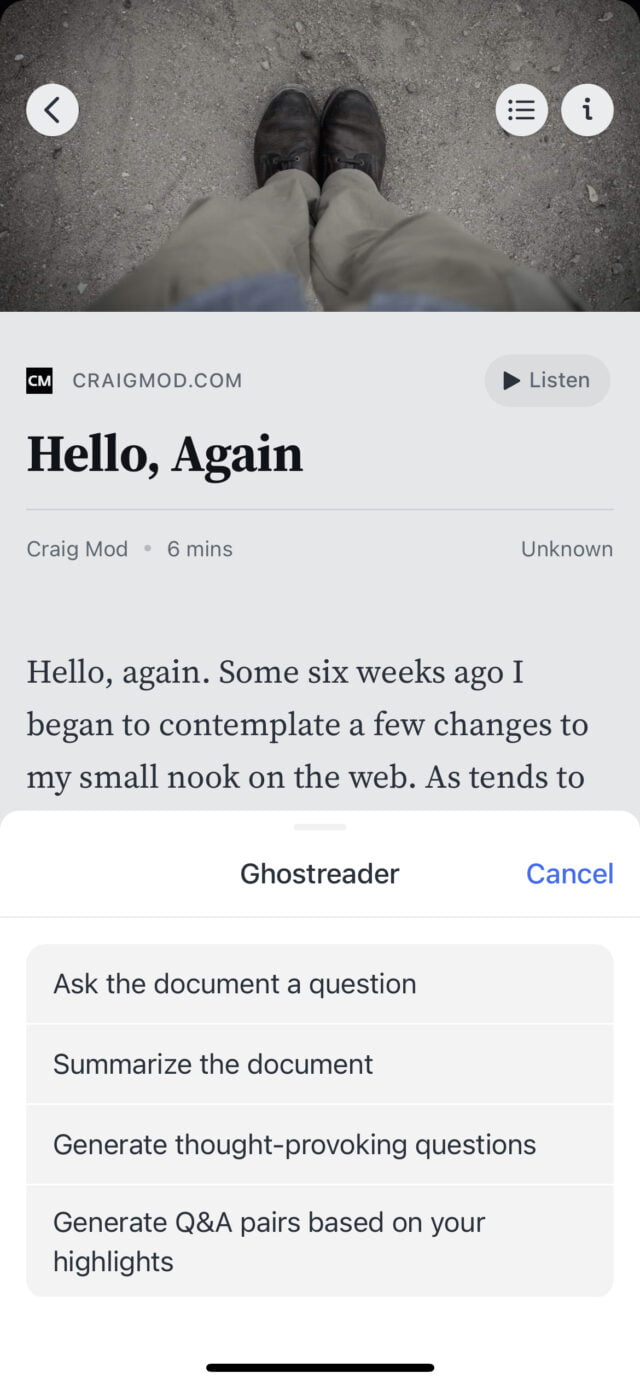AI-toepassingen maken hun intrede in tools die ik al een tijdje gebruik. Omdat ik in een vertrouwde omgeving opeens de kracht van AI ziet, komt het op mij veel functioneler en verrassender over.
Zoals de GPT-3-integratie in de app Reader van Readwise. Die hebben ze ‘Ghostreader’ genoemd.
Ghostreader werkt sinds deze week ook in de mobiele versie van Reader en ik vind het geweldig.

Al mijn nieuwsbrieven, rss-feeds en read-it-later-artikelen belanden in Reader. Dat gaat om honderden artikelen per week.
Dat kost veel tijd om te lezen. Soms valt zo’n stuk tegen. Die tijd krijg ik nooit meer terug.
Maar dankzij Ghostreader kan ik de volgende dingen doen:
- Het document een vraag stellen
- Het document samenvatten
- Prikkelende vragen genereren
- Q&A’s genereren op basis van mijn highlights
Optie 1: Het document een vraag stellen
Heel handig als je bijvoorbeeld een artikel schrijft over een research paper. Dan kun je gericht zoeken in zo’n eindeloze pdf.
Optie 2: Het document samenvatten
Vind ik ideaal om te bepalen of een ik een stuk wel wil lezen. Zo twijfelde ik over dit artikel van Dirt: Booksmart.
Na het lezen van deze samenvatting dacht ik, ‘hier wil ik meer over weten!’:
This text discusses the concept of the “aesthetic of bookishness,” which is the trend of displaying a love for literature through social media. The article explains that authors today must often perform an intellectual persona on social media in order to make their work successful, and that the physical book has become a symbol of cultural status. It also questions the difference between writers and influencers, and how the distinction between the two has become blurred. Finally, it posits that readers still look to books for meaning, and that the aesthetic of bookishness is a way to engage with the written word online.
Deze functie is ook handig als je een notitie in je tweede brein wilt maken. Je kunt dan van alle artikelen en boeken makkelijk een samenvatting maken en daardoor sneller door je tweede brein browsen.
Optie 3: Prikkelende vragen genereren
Stel dat ik over Booksmart wil praten in POM. Dan kan Ghostreader mij op weg helpen door alvast wat vragen te bedenken:
- What are the implications of the commodification of books in the digital age?
- What are the implications of social media in influencing readership and changing the identity of authorship?
- How has the aesthetic of bookishness been used to promote books and reading in popular culture?
Het zijn misschien niet één-op-één de vragen die ik in mijn podcast ga stellen, maar ze brengen me wellicht wel op nieuwe ideeën.
Optie 4: Q&A’s genereren op basis van mijn highlights
Deze testte ik bij een artikel waar ik veel highlights had gemaakt: The Art and Science of Spending Money.
Daar kwam het volgende uit:
Q: What did Montesquieu write about 275 years ago?
A: Montesquieu wrote, “If you only wished to be happy, this could be easily accomplished; but we wish to be happier than other people, and this is always difficult, for we believe others to be happier than they are.”Q: According to Ramit Sethi, how should you spend money?
A: Ramit Sethi says, “Frugality, quite simply, is about choosing the things you love enough to spend extravagantly on—and then cutting costs mercilessly on the things you don’t love.”Q: What is the ultimate goal for many people when it comes to money?
A: Many people want to have enough money that they can stop thinking about it and focus on other things.
Probeer Reader via deze link twee maanden gratis uit.
Afbeelding hierboven gemaakt met Midjourney
